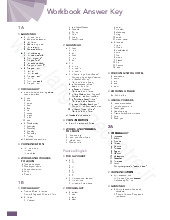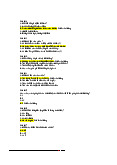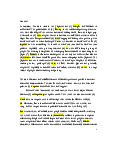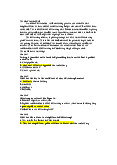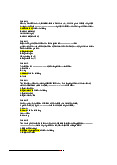








Preview text:
Activity 1:
Here are steps of running a hotel, each step is followed by a list of tasks. Match each step
with the correct list of tasks associated with it. Steps A. Strategic Planning B. Setting Up C. Staffing D. Marketing and Sales E. Operations Management F. Financial Management G. Customer Service H. Continuous Improvement Details of Work
1. ( ) Choose location, secure permits, design, and furnish.
2. ( ) Hire and train staff for various departments.
3. ( ) Budget, revenue management, and financial reporting.
4. ( ) Develop brand identity, establish online presence, and implement sales strategies.
5. ( ) Ensure positive guest experiences and handle complaints.
6. ( ) Manage front office, housekeeping, maintenance, and food and beverage services.
7. ( ) Define hotel concept, target market, and business plan.
8. ( ) Regularly update procedures and adopt innovations. Activity 2:
HAVE YOU GOT WHAT IT TAKES TO RUN A HOTEL?
Read the article about running a hotel. Find and underline the qualities and skills in the
box in the article below. Why are they useful?
excellent business sense motivating outgoing quick-thinking theatrical
What were the room occupancy rates in the previous quarter? Why are the flowers at the front
desk not fresh? The Deputy Housekeeper is unexpectedly off sick today; what should we do?
These are common scenarios that hotel managers in Vietnam must address daily. Holding such a
position is highly demanding, as it requires a unique set of skills. It’s often humorously said by
hotel managers that one needs to be from the planet Krypton to handle the job effectively,
suggesting that only someone with Superman's abilities could manage the vast array of
administrative, aesthetic, and financial decisions required each day. If you're not Superman, you
must at least be energetic, quick-witted, and possess a blend of strong interpersonal skills and sharp business acumen.
The hotel industry in Vietnam also has a significant performance element to it; hotel managers
are in the spotlight throughout the day, always ensuring guest satisfaction with a smile. This role
requires managers to have a natural flair for performance and an extroverted personality. Equally
important is the ability to stay driven and to inspire others, especially when managing daily
operations alongside the team that makes everything work smoothly behind the scenes. The job
is exhaustive, demanding constant dedication and a significant amount of energy. Managing
challenging and demanding guests can be especially taxing, with a recent survey indicating that
over 70% of hotel owners in Vietnam report feeling not just tired but 'completely drained' at the end of a workday.
Nevertheless, the hospitality industry remains one of the most captivating and rewarding fields.
It offers a dynamic work environment where no two days are alike. The greatest reward comes
from meeting the fundamental human needs for nourishment, warmth, comfort, and fellowship.
While it’s not possible to please everyone all the time, the essence of hospitality lies in the continual effort to do so.
1. Why is being born on Krypton metaphorically suggested for hoteliers in Vietnam?
2. How does the concept of a theatre relate to hotel management in Vietnam?
3. What does the term '24/7 commitment' imply in the context of the Vietnamese hospitality industry?
4. In what ways do Vietnamese hoteliers cater to the basic human needs of their guests? True/False/Not Given
1. The hospitality industry in Vietnam requires hoteliers to have superhuman abilities.
2. Hotel managers must originate from the planet Krypton to be successful in their roles.
3. An outgoing personality is essential for hotel management success in Vietnam.
4. The analogy of being 'on stage' is used to describe the constant guest interaction required in hotel management.
5. Hotel managers are expected to work only during set business hours, according to the '24/7 commitment'.
6. Managing difficult guests is highlighted as a major challenge for hoteliers in Vietnam.
7. The daily routine in the hospitality industry is highly unpredictable.
8. Emotional well-being of guests is a priority for Vietnamese hoteliers alongside providing basic amenities.
9. Financial gain is the foremost incentive for individuals in the Vietnamese hospitality sector.
10. Efforts to please guests are central to the ethos of the Vietnamese hospitality industry. Activity 3: LISTENING
A DAY IN THE LIFE OF A HOTEL MANAGER
1. Listen to Jim Reginato, Manager of the International Pacific Hotel in Los Angeles,
talking about his job. Number the activities in the correct order.
___ Say hello to the guests ___ Do administrative work
___ Review the Night Manager’s reports
___ Attend a strategy and planning meeting ___ Check emails
___ Have lunch with staff members
___ Attend the daily staff briefing
___ Check the breakfast arrangements
Listen again and complete the information about Jim's problems and projects. Problems this morning
1. One guest’s ______ didn’t arrive for an hour and a half, so we need to find out why.
2. This morning, we ran out of ______ in the restaurant.
3. We’ve actually got a potential ______ problem at the end of this week, so we had to discuss
alternative accommodation arrangements for the extra guests. Ongoing projects
1. At the moment we’re planning a major ______ of all the guestrooms and suites.
2. We’re sending the sales team over to Australia and New Zealand to get more ______ business.
3. We’ve had problems with check-out ______ times recently, so we’re reviewing our ______ policy. Activity 4: MAKING PRESENTATIONS
What are common mistakes that people make when they give a presentation? Discuss your
ideas with a partner and feed back to the class.
Complete the DOs and DON'Ts with the phrases a-j below.
a. ask if there are any questions
b. forget to check your spelling c. greet the audience
d. stand in front of the screen e. speak clearly f. keep to the time allowed
g. use lots of different colours and fonts h. read from a script i. keep to your plan j. use a small font
PROFESSIONAL SKILLS: GIVING PRESENTATIONS
DO 1. _____ (e.g. Good morning, ladies and gentlemen) and tell them who you are. 2. _____ at a
natural speed. Don’t rush or talk deliberately slowly. 3. _____. Finishing early is better than
running into extra time. Allow about two minutes for each slide. 4. _____. Don’t be tempted to
digress – you will waste time and you might lose your concentration. 5. _____. If they are slow in coming, have some ready.
DON'T 6. _____. Prepare short prompts instead and rehearse your talk in advance so you feel
confident. 7. _____. Check that everyone can see. 8. _____ or put too many words on the slide.
Keep your slides clear and simple. 9. _____. It makes the information difficult to read, especially
from the back of the room. 10. _____ on your slides. Mistakes of this kind can create a very bad impression. Activity 5: Speaking MAKING HOTEL IMPROVEMENTS
Work in groups. You work for an extremely badly run hotel in central New York. You have three
months in which to improve the situation or it will be closed down.
1. Begin by working individually. Make a list of ideas for how to make a hotel efficient. Think
about: booking and reservation, staff training, rooms and housekeeping, room service and
restaurants, maximizing profit margins, differentiation from the competition, use of technology and target customers.
2. Hold a meeting to exchange your ideas and agree on an action plan.
3. Organize the information about your action plan into a presentation.
4. Present your action plan to the class. Activity 6: HOTEL INSPECTION Speaking INSPECTION CRITERIA
How does a hotel inspector evaluate a hotel? What might he or she expect when checking
the following aspects of a hotel’s service? 1. reservations 2. room service 3. restaurant 4. reception area 5. staff 6. rooms Activity 7: Listening THE HOTEL INSPECTOR
1. Tina Chapman is an inspector for the Miramar chain of hotels. Listen to her talking about what
she expects when she’s evaluating different services. Does she mention any of your ideas from Exercise 1?
2. Listen again. Match the hotel service areas 1–6 with Tina’s checklist criteria a–f. 1. Reservations 2. Reception area 3. Rooms 4. Room service 5. Restaurant 6. Staff
a. speed of service, clean cutlery and plates, asked if enjoyed meal
b. politeness, friendliness, use of name
c. clean and tidy, looks welcoming, offer to help with baggage
d. use of name, speed of response, ability to answer questions
e. clean and tidy, en-suite facilities, everything in place
f. speed of response, ability to answer questions, upselling Activity 8: HOTEL STATISTICS
Listen to part of a report by the American Hotel Standards Inspectorate on improving
standards in hotels in the USA. Complete the statistics.
One significant area of improvement was in wireless internet access. 1 ____ of the hotels
inspected had wireless internet connection compared with only 2 ____ from just four years
earlier. In addition to this, the number of hotels that charge for in-room internet use is decreasing.
3 ____ of hotels inspected currently charge for this service, down from 4 ____ last year and 5
____ in the previous year. Thirty-five percent of the hotels inspected offer iPod docking stations
in-room. Of these, 6 ____ were five-star hotels and 7 ____ were four-star hotels. It is also
encouraging to note that hotel managers are becoming more environmentally responsible. 8 ____
of hotels now use energy-efficient lighting. 9 ____ of the hotels inspected are planning to adopt
Leadership in Energy & Environmental Design (LEED) standards in the next 10 ____ months.
Twenty percent have already done so in the past quarter. Answers: Activity 9: Human resource problems
Read the article about Paris hotels. What kinds of problems do many hotels in Paris have these days? Why? Hotels in Paris
PARIS — The French hotel industry is facing a nationwide problem of high staff turnover and a
shortage of skilled employees. The problem is even worse in the nation’s capital, where turnover
is up to 15 percent higher than in the provinces. According to a recent French government report,
over 50 percent of young hotel employees in Paris leave their jobs within six months of being
taken on, creating a real headache for employers. The reasons for this high turnover include low
salaries, anti-social working hours and undervalued jobs with limited career prospects. The result
is an undermotivated and often incompetent workforce. Activity 10:
Alexandre Huchet, the Manager of the Howatt Hotel in Paris, has employed a consultant to help
the hotel improve. Listen to the consultant’s interviews with the members of staff. What
problems does each person mention and what suggestions do they make? Acitivity 10: Formal email:
Subject: Response to Your Concerns Regarding [Specific Issue or General Service]
Dear [Hotel Manager's Name],
Introduction: Acknowledgement of the Complaint
Express appreciation for bringing the issue to your attention.
Acknowledge the hotel manager’s concerns.
Body: Addressing the Complaints 1. Situation Overview
Briefly summarize the situation to show understanding.
2. Details of Specific Complaints
List and address each complaint with facts and findings.
3. Proposed Solutions or Actions Taken
Outline the steps you are taking or propose to take to resolve the issues.
4. Future Preventative Measures
Discuss any changes in policy or procedure to prevent future occurrences.
Conclusion: Reaffirming Commitment
Reaffirm your commitment to quality service and customer satisfaction.
Offer additional assistance or a point of contact for further discussion. Closing
Thank the manager for their patience and understanding.
Provide your contact information for any further correspondence. Sign-Off Professional closing remark. Your full name and position.
Your company name (if applicable).
Complaint Email to Hotel Manager:
Subject: Service Issue During Stay at [Hotel Name] Dear [Hotel Manager's Name],
I hope this message finds you well. I am writing to express my dissatisfaction with the service
during my recent stay at [Hotel Name] from [Date] to [Date].
Upon my arrival, I encountered a problem with [describe the specific service issue, such as a
room not being ready, a problem with the room, etc.]. I had expected [mention the expected
service or condition], but unfortunately, that was not the case. [Provide any specific details of the
incident, including dates, times, and names if relevant.]
I brought this to the attention of [mention the staff involved or the front desk], but [describe the
response received, if it was inadequate or not addressed promptly].
This experience was disappointing and not what I anticipated from a hotel with such a reputable
standard of service. I am hoping for a resolution that reflects the quality and customer service
commitment that [Hotel Name] is known for.
Thank you for your attention to this matter. I look forward to your prompt response. Sincerely,
[Your Full Name] [Your Contact Information]
Your Task: Write a reply to the customer's email. In your response, you should:
1. Acknowledge the customer's dissatisfaction.
2. Apologize for the inconvenience caused.
3. Address each of the issues raised by the customer.
4. Provide a brief explanation or reason for the problems (if any).
5. Offer a resolution or compensation to the customer.
6. Reassure the customer about the measures being taken to prevent such issues in the future.
7. Invite them to visit again with a promise of a better experience. Requirements:
Your reply should be professional and empathetic.
Make sure the reply is concise and does not exceed 150 words.
Use polite and courteous language throughout the response.
End with your name, position, and the hotel's name.
